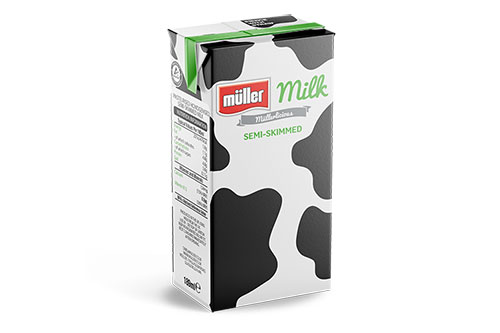Monday February 21st 2022

The Müller non-organic, semi-skimmed Scottish milk in 189 millilitre recyclable cartons currently used in Edinburgh schools. Image copyright Müller.
An Edinburgh primary school is set to ditch cartoned milk for pupils’ mid-morning break as part of a councillor’s bid to drive down waste.
St Andrews Primary has volunteered to take part in a pilot scheme which, if approved, would see a milk dispenser installed in the school for pupils to use.
The scheme may struggle for support however, with a report revealing that rolling it out city-wide would cost up to £113,000 more per year on the delivery of milk in schools – as well as a one-off payment of £40,000 for reusable cups – with parents potentially footing the bill.
Edinburgh City Council also warned that a move towards using milk dispensers in schools could lead to a reduction in uptake, as some pupils prefer “aesthetically pleasing, paper cartons”.
Green Party councillor Steve Burgess tabled a motion in September highlighting the introduction of organic milk along with a reduction in single-use plastic containers in primary schools in East Ayrshire.
Arguing the move could have health benefits for children whilst creating less waste, Councillor Burgess called for officers to investigate the feasibility of doing the same in Edinburgh.
His motion – passed by 33 votes to 20 – further noted pupils from some schools across the city requested organic milk and reduced plastic packaging “as long ago as 2019”.
Currently in the final year of a four-year contract with Müller, the council buys non-organic, semi-skimmed Scottish milk in 189 millilitre recyclable cartons for nursery and primary 1-3 pupils to drink during mid-morning break.
A report to councillors states that the “key difference” between organic farming and standard farming is “the use of natural fertilizers instead of chemical fertilizers”.
“Hormone and antibiotic treatments are not used in organic milk. However, committee is asked to note that these are not used in Müller’s conventional milk either,” it goes on to say.
“Müller confirm that all of the milk provided comes from Scottish farms and that their policy is not to milk any livestock undertaking antibiotic treatment for the period of the treatment.”
The alternative to providing milk in cartons, it adds, would be to dispense it from a 13-litre refrigerated pergal machine into reusable cups.
Despite significantly reducing waste, the council notes this option “could lead to increased costs of delivery” and “place a greater responsibility on school staff”.
It adds: “If pergal machines were introduced, the number of machines would depend on the size of the school.
“The cost of delivery would increase as school teams would become responsible for pouring milk into cups, taking the cupped milk to classrooms and washing the cups and pergal after each use.”
It’s estimated switching to cartonless organic milk would cost the council between £83k and £113k more each year – an increase which would be “passed on to parents” if not addressed as part of budget setting.
Providing reusable cups for pupils is priced at around £40,000, with an annual budget required for replacement cups, whilst the milk dispensers cost £525 each.
The council says the existing packaging is “100 per cent recyclable” and that replacing plastic straws on cartons with paper straws “has equated overall to removal of 48 tonnes of plastic already”.
Furthermore, it adds there is currently “inconclusive evidence” to support the argument that organic milk is healthier and better for a child’s development than standard milk.
After Councillor Burgess’ motion was passed, council officers made contact with Stirling Council.
The local authority previously switched milk delivery in schools from cartons to two litre jugs and reusable cups.
Following this move, consumption reportedly dropped significantly, with nearly a third less pupils taking break time milk because “children were no longer responsible for the amount of milk they consumed” and it wasn’t available to them “in aesthetically pleasing, paper cartons filled to the correct amount with a paper straw provided for drinking”.
Officers also reached out to several Edinburgh schools for thoughts on how the changes would affect their mid-morning milk process.
A majority responded saying they felt it was “not currently feasible” due to staffing pressures.
But the council received an enthusiastic response from St Andrews Primary, which has volunteered to take part in a pilot scheme.
Staff indicated their focus is on reducing waste rather than the introduction of organic milk, saying they are happy to continue providing pupils with the existing product but through the proposed dispensers.
If agreed by councillors at the Policy and Sustainability Committee on Tuesday of this week, the school will trial the use of milk pergals and reusable cups between Easter and Summer.
Edinburgh City Council says using organic milk for the pilot “is not felt to be practicable” as there would be “no way in which to measure health benefits to children and the procurement of a relatively small amount of organic milk would not be efficient”.
Tweet Share on Facebook